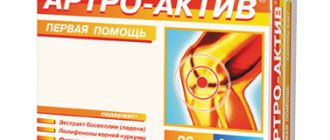Manufacturer: DIODE
Active ingredients
- Not indicated. See instructions
Pharmacological action
- Not indicated. See instructions
- Description of pharmacological action Longevity
- Composition Longevity
- Indications for use of the drug Dolgolet
- Release form of the drug Dolgolet
- Contraindications to the use of the drug Dolgolet
- Method of administration and dosage of the drug Dolgolet
- Storage conditions for the drug Dolgolet
- Shelf life of the drug is Longevity
Description of pharmacological action
Longevity contains a rich complex of essential substances and meets the body's needs for amino acids, vitamins, microelements and polysaccharides. Longevity protects against diseases of the heart and blood vessels, normalizes heart rhythm, protects against the formation of atherosclerotic plaques, and ensures stable blood pressure. Increases nonspecific resistance of the body. Stimulates intestinal motility, normalizes intestinal microflora. Normalizes metabolic processes. Eliminates dystrophic changes and ensures physiological regeneration of the mucous membranes of the stomach, intestines and genitourinary system. Thanks to easily digestible organic silicon, it improves the condition of hair, nails, connective and bone tissues. Regulates carbohydrate metabolism and prevents the development of diabetes.
Pharmacological properties of Dolgolet
The effect of the drug is determined by the healing properties of the Jerusalem artichoke concentrate included in Longevity. What is explained by the content in it:
- A whole complex of well-digestible polysaccharides of plant origin: inulin, which constitutes up to 62% of the weight of one tablet of the drug, as well as pectin substances, constituting 5% of its weight;
- Vitamin complex, especially high content of vitamins B1, B2, B6, PP and ascorbic acid in Jerusalem artichoke concentrate;
- Mineral elements, mainly the product contains silicon, iron, magnesium, potassium, calcium, phosphorus.
The specific taste of Dolgolet tablets is given by organic acids, which are represented not only by di- and tricarboxylic acids of the Krebs cycle (malic, fumaric, citric and succinic), but also by polyhydroxy acids of the primary oxidation of sugars.
The unique properties of Jerusalem artichoke were discovered at the beginning of the last century by the Soviet botanist Nikolai Ivanovich Vavilov after visiting the reservations of the Iroquois Indians. Long-term studies and reviews of longevity (which is what Jerusalem artichoke is sometimes called) indicate that this plant is not only food, but also a cure for many diseases. Its use in the form of plates, powders, tablets, decoctions and water infusions improves cellular nutrition and the processes of removing toxic substances from the body, stimulates rejuvenation and renewal of cellular structures, normalizes the function of the digestive system, and helps reduce the concentration of lipids and cholesterol in the blood.
Thanks to its unique composition, Dolgolet also activates metabolic processes, in particular those occurring at a high energy level in all organs, tissues and systems of the body.
It has been scientifically proven, and reviews of Longevity confirm this fact, that the drug in combination with the main therapy in patients with non-insulin-dependent diabetes mellitus (i.e. type 2) helps reduce the concentration of cholesterol and low-density lipoproteins, which act as the main carriers of cholesterol in the body.
With the use of Dolgolet in children with bronchial asthma, during periods of remission of the disease, an improvement in the general functional state is noted, and the protective properties of the body's immune system increase.
The drug has proven itself as an effective remedy for combating obesity, manifestations of atherosclerotic damage to the walls of blood vessels, urolithiasis, ulcerative-erosive lesions of the gastrointestinal tract, and pathologies of the liver and kidneys.
Best before date
36 months
Vitamins with similar effects
- Pantohematogen "Altamar™-3" (Capsule)
- Pantohematogen "Altamar™-4" (Oral tablets)
- Maxiflorum For skin. Strengthened formula (Oral tablets)
- Yogi Healthy Fasting (Herbal tea)
- Yogi-T Get Regular (Herbal tea)
- Kedron-Iva (Oral tablets)
- Algiton (Capsule)
- Pankragen (Capsule)
- Niuhuang Jiangua (Oral tablets)
- ACIDOPHILIS-BIFIDUM PLUS VITAMIN C Kid's formula (Chewable tablets)
The description of vitamin Longevity is intended for informational purposes only. Before starting to use any drug, it is recommended to consult a doctor and read the instructions for use. For more complete information, please refer to the manufacturer's instructions. Do not self-medicate; EUROLAB is not responsible for the consequences caused by the use of information posted on the portal. Any information on the project does not replace consultation with a specialist and cannot be a guarantee of the positive effect of the drug you use. The opinions of EUROLAB portal users may not coincide with the opinions of the site Administration.
Are you interested in Vitamin Longevity? Do you want to know more detailed information or do you need a doctor's examination? Or do you need an inspection? You can make an appointment with a doctor - the Euro lab is always at your service! The best doctors will examine you, advise you, provide the necessary assistance and make a diagnosis. You can also call a doctor at home . Euro lab clinic is open for you around the clock.
Attention! The information presented in the vitamins and dietary supplements section is intended for informational purposes and should not be a basis for self-medication. Some of the drugs have a number of contraindications. Patients need to consult a specialist!
If you are interested in any other vitamins, vitamin-mineral complexes or dietary supplements, their descriptions and instructions for use, their analogues, information about the composition and form of release, indications for use and side effects, methods of use, dosages and contraindications, notes about the prescription of the drug for children, newborns and pregnant women, price and consumer reviews, or you have any other questions and suggestions - write to us, we will definitely try to help you.
Stopress
Stable coronary heart disease
If an episode of unstable angina (significant or not) develops during the first month of therapy with Stoppress, it is necessary to assess the benefit/risk ratio of therapy with this drug.
Arterial hypotension
ACE inhibitors can cause a sharp decrease in blood pressure. In patients with uncomplicated arterial hypertension, symptomatic hypotension rarely occurs after taking the first dose of Stoppress. The risk of an excessive decrease in blood pressure is increased in patients with reduced blood volume during diuretic therapy, while following a strict salt-free diet, hemodialysis, as well as with diarrhea or vomiting, or with severe renin-dependent arterial hypertension. Severe arterial hypotension is observed in patients with severe CHF, both in the presence of concomitant renal failure and in its absence. The most common arterial hypotension can develop in patients with more severe CHF, taking loop diuretics in high doses, as well as against the background of hyponatremia or renal failure. Close medical monitoring is recommended for these patients during initiation of therapy and during dosage titration. The same applies to patients with coronary artery disease or cerebrovascular diseases, in whom an excessive decrease in blood pressure can lead to myocardial infarction or cerebrovascular complications.
In the event of arterial hypotension, it is necessary to place the patient in a horizontal position with raised legs, and, if necessary, administer sodium chloride solution (0.9%) intravenously to increase the volume of blood volume. Transient arterial hypotension is not a contraindication for further therapy. After restoration of blood volume and blood pressure, treatment can be continued provided that the dose of Stoppress is carefully selected.
In some patients with CHF and normal or low blood pressure, an additional decrease in blood pressure may occur during therapy with Sgopress. This effect is expected and is usually not a reason to discontinue the drug. If arterial hypotension is accompanied by clinical manifestations, it may be necessary to reduce the dose or discontinue Stoppress.
Aortic or mitral valve stenosis/hypertrophic obstructive cardiomyopathy
ACE inhibitors, incl. and the drug Stopress should be used with caution in patients with mitral valve stenosis and left ventricular outflow tract obstruction (aortic valve stenosis and hypertrophic obstructive cardiomyopathy).
Renal dysfunction
In patients with renal failure (creatinine clearance less than 60 ml/min), the initial dose of Stoppress should be selected in accordance with the clinical clearance (see section “Dosage and Administration”) and then depending on the therapeutic response to therapy. For such patients, regular monitoring of serum potassium and creatinine levels is necessary.
In patients with symptomatic heart failure, arterial hypotension that develops during the initial period of therapy with ACE inhibitors can lead to deterioration of renal function. Cases of acute renal failure, usually reversible, have sometimes been reported in such patients.
In some patients with bilateral renal artery stenosis or renal artery stenosis of a solitary kidney (especially in the presence of renal failure), an increase in serum concentrations of urea and creatinine was observed during therapy with ACE inhibitors, which was reversible after discontinuation of therapy. In patients with renovascular hypertension during therapy with ACE inhibitors, there is an increased risk of developing severe arterial hypotension and renal failure. Treatment of such patients should begin under close medical supervision, with small doses of the drug and with further adequate dose selection. During the first weeks of therapy with Stoppress, it is necessary to discontinue diuretics and regularly monitor renal function.
In some patients with arterial hypertension, in the presence of previously undetected renal failure, especially with concomitant diuretic therapy, there was a slight and temporary increase in serum urea and creatinine concentrations. In this case, it is recommended to reduce the dose of Stoppress and/or discontinue the diuretic.
Hemodialysis patients
Several cases of persistent, life-threatening anaphylactic reactions have been reported in patients undergoing dialysis using high-flux membranes (eg, AN 69) and concomitantly taking ACE inhibitors. If hemodialysis is necessary, a different type of membrane must be used. Kidney transplantation
There is no experience with the use of Stoppress in patients with recent kidney transplantation.
Hypersensitivity/angioedema
Rarely in patients taking ACE inhibitors, incl. perindopril, angioedema of the face, extremities, lips, tongue, glottis and/or larynx developed. This condition can develop at any time during treatment. If angioedema develops, treatment should be stopped immediately, and the patient should be under medical supervision until symptoms disappear completely. Angioedema of the lips and face usually does not require treatment; Antihistamines can be used to reduce the severity of symptoms.
Angioedema of the tongue, glottis, or larynx can be fatal. If angioedema develops, it is necessary to immediately administer epinephrine (adrenaline) subcutaneously and ensure airway patency.
ACE inhibitors are more likely to cause angioedema in black patients. Patients with a history of angioedema not associated with the use of ACE inhibitors may be at high risk of developing angioedema while taking an ACE inhibitor.
Anaphylactoid reactions during low-density lipoprotein apheresis (LDL apheresis)
In patients prescribed ACE inhibitors during the procedure of LDL apheresis using dextran sulfate, in rare cases, an anaphylactic reaction may develop. It is recommended to temporarily discontinue the ACE inhibitor before each LDL apheresis procedure.
Anaphylactic reactions during desensitization
In patients receiving ACE inhibitors during a course of desensitization (for example, hymenoptera venom), in very rare cases, life-threatening anaphylactic reactions may develop. It is recommended to temporarily discontinue the ACE inhibitor before each desensitization procedure.
Liver failure
During therapy with ACE inhibitors, it is sometimes possible to develop a syndrome that begins with cholestatic jaundice and then progresses to fulminant liver necrosis, sometimes with death. The mechanism of development of this syndrome is unclear. If jaundice occurs or an increase in liver enzyme activity occurs while using an ACE inhibitor, the ACE inhibitor should be discontinued immediately and the patient should be closely monitored. It is also necessary to conduct an appropriate examination.
Neutropenia/agranulocytosis/thrombocytopenia/anemia
Cases of neutropenia/agranulocytosis, thrombocytopenia and anemia have been reported in patients treated with ACE inhibitors. With normal renal function in the absence of other complications, neutropenia rarely develops. The drug Stoppress should be used with great caution in patients with systemic connective tissue diseases (for example, SLE, scleroderma), simultaneously receiving immunosuppressive therapy, allopurinol or procainamide, as well as when combining all of these factors, especially with existing renal impairment. Such patients may develop severe infections that do not respond to intensive antibiotic therapy. When carrying out therapy with Stoppress in patients with the above factors, it is recommended to periodically monitor the number of leukocytes in the blood and warn the patient about the need to inform the doctor about the appearance of any symptoms of infection.
Negroid race
The risk of developing angioedema in black patients is higher. Like other ACE inhibitors, Stoppress is less effective in lowering blood pressure in black patients, possibly due to the higher prevalence of low-renin conditions in the population of this group of patients with arterial hypertension.
Cough
During therapy with ACE inhibitors, a persistent, non-productive cough may develop, which stops after discontinuation of the drug. This should be taken into account in the differential diagnosis of cough.
Surgery/general anesthesia
In patients whose condition requires major surgery or general anesthesia with drugs that cause hypotension, ACE inhibitors, including Stoppress, may block the formation of angiotensin II with compensatory renin release. One day before surgery, therapy with ACE inhibitors must be discontinued. If the ACE inhibitor cannot be canceled, then arterial hypotension developing according to the described mechanism can be corrected by increasing the volume of blood volume.
Hyperkalemia
During therapy with ACE inhibitors, including perindopril, potassium levels in the blood may increase in some patients. The risk of hyperkalemia is increased in patients with renal and/or heart failure, decompensated diabetes mellitus, and in patients using potassium-sparing diuretics, potassium supplements, or other drugs that cause hyperkalemia (eg, heparin). If it is necessary to prescribe these drugs simultaneously, it is recommended to regularly monitor the potassium content in the blood serum.
Diabetes
In patients with diabetes mellitus taking oral hypoglycemic agents or insulin, blood glucose concentrations should be carefully monitored during the first few months of ACE inhibitor therapy.
Lithium
Concomitant use of lithium and Stoppress is not recommended. Potassium-sparing diuretics, potassium-containing drugs, potassium-containing foods and nutritional supplements
Concomitant use with ACE inhibitors is not recommended.



